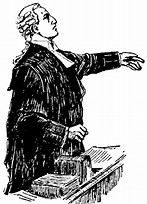 Let me tell you about my latest obsession: the British legal system. I came upon this topic by accident. Two weeks ago, I had a two-day hearing in Barrow County, Georgia, with some colleagues. For those of you who do not know much about Georgia geography, Winder is not near my office. And to get there from here requires a Hobson’s choice of routes. Either (A) I go through Atlanta traffic on the interstate to work my way there, or (B) I avoid all of that in exchange for a set of two-lane roads where I will inevitably travel behind buses, garbage trucks, or the elderly. A smarter version of me would have stayed in Winder for two nights. But I opted to commute both days. And so I do what I do when I have a bunch of driving, I cash in an audible credit. And when I truly need the stress relief, I seek out a legal thriller. Mind you, I do not really care if the legal thriller I choose is completely mindless. Indeed, I may ever prefer the mindless variety. I also did not research my choice very well. I searched for my book from the driveway before I left. And I have a very short window of time for such things in the driveway before my wife comes out and throws up her hands in disbelief that I am in the driveway with the car running for a long period of time.
Let me tell you about my latest obsession: the British legal system. I came upon this topic by accident. Two weeks ago, I had a two-day hearing in Barrow County, Georgia, with some colleagues. For those of you who do not know much about Georgia geography, Winder is not near my office. And to get there from here requires a Hobson’s choice of routes. Either (A) I go through Atlanta traffic on the interstate to work my way there, or (B) I avoid all of that in exchange for a set of two-lane roads where I will inevitably travel behind buses, garbage trucks, or the elderly. A smarter version of me would have stayed in Winder for two nights. But I opted to commute both days. And so I do what I do when I have a bunch of driving, I cash in an audible credit. And when I truly need the stress relief, I seek out a legal thriller. Mind you, I do not really care if the legal thriller I choose is completely mindless. Indeed, I may ever prefer the mindless variety. I also did not research my choice very well. I searched for my book from the driveway before I left. And I have a very short window of time for such things in the driveway before my wife comes out and throws up her hands in disbelief that I am in the driveway with the car running for a long period of time.
And so it was that I bought Nick Stone’s The Verdict. I realized after it was too late that I had downloaded a British legal thriller. But I couldn’t fiddle with the phone too much as I had opted for the two-lane route to Barrow County. And the narrator had a pleasing accent. And all this was fine because I was quickly enthralled in the story. And as much as I was enthralled with the story, I was intrigued by how a client with a criminal matter hires legal representation in England. I just finished up the book this week. And I’ve now watched a documentary on barristers. And I also have a law student this semester who grew up in England who has endured my OCD questions to her about all of this (may God have mercy upon her).
So, I am about to launch into some fairly sweeping opinions with my research on this subject consisting of (1) nearly two decades of experience as an American criminal defense attorney; (2) having listened to a British legal thriller; (3) having read some John Mortimer Rumpole stories a long time ago; (4) having watched a short documentary; and (5) having quizzed a British law student of mine about all of this. Feel free to correct me if you know more than I do on these subjects. I am very aware of the flaws in our system, and I may be blind to the flaws in the alternative.
Flaws in the American System
Here are some of the differences. In America, you get in trouble, and you retain a lawyer. The lawyer is your one stop shop for your representation. You might go to a big firm, but most American criminal defense attorneys are in solo practice or a very small firm (2-3 lawyers tops). If you’re in some deep trouble as a CEO in a large company, you might end up in the white collar division of a large law firm. But generally you are going to hire somebody in a small shop. If you cannot afford a lawyer, you may get a public defender of some sort, either from a government office or by appointment. And if you get your lawyer by appointment, it will be a lawyer who takes appointments and who does some retained work — somebody in a small shop as discussed at the beginning of this paragraph. Your lawyer will not prosecute and defend cases at the same time. He may have been a prosecutor in a past life. Or he may one day close up his shop and be a prosecutor. But we do criminal defense the way we do marriage in America. Just as we have multiple spouses here serially (one at a time), so we can either be wedded to the State or to the defense serially. Your lawyer will not have prosecution and defense clients (there might be some exceptions. But this is the general rule).
You will have found your lawyer any number of ways, ranging from the sensible to the absolute lunatic method. The sensible and more educated client will have sought out a referral from a trusted lawyer, friend, or family member who has some insider knowledge of who the good lawyers are. That is one side of the spectrum. On the other side of the spectrum (may God have mercy on your soul), you will have googled “DUI Hahira Georgia” and have come to find your lawyer that way. In which case, you may have found a great lawyer or you may have found the lawyer who is great at search engine optimization and is not much of a lawyer at all. Or you may hire the guy who wrote Aunt Jeana’s will. Or the lawyer may have found you after purchasing the police blotter from the day you were arrested and directly soliciting you (I cannot invoke God’s blessings if you go with this lawyer, as God has clearly long since abandoned your soul and taken your IQ away). By the way, the appellate clients have been burned and become the savviest shoppers for legal services at this point in the case (if they haven’t become sovereign citizens).
The lawyer you find may be great, or he may show up to your hearing two hours late, wearing a stained shirt and wrinkled suit, with a fresh buzz from the oxycodone he just freebased out in the parking lot. You are sort of playing the lottery. More likely than not, the judge will pretend that your lawyer’s shirt is clean, his suit is pressed, and that he is not falling asleep as he selects the jury who will decide your fate. From the judge’s perspective, it’s hard to move the docket if you remove lawyers or take other remedial action (Every docket has lawyers like this. Seriously, every docket.). And under the Strickland standard, the appellate courts will likely find that buzzed lawyering was “appropriate trial tactics” and that there wasn’t much of a likelihood of a different result with a sober lawyer who smelled good.
The lawyer you hire will do it all. He will run the office, take your fee, investigate your case (perhaps with the assistance of a paid investigator), serve the subpoenas, find experts, take your calls and emails, negotiate a resolution, and represent you in court.
If your lawyer wears a coat and tie when he meets with you, it is as dressed up as he will be. When he is in court, he will be wearing a coat and tie there, too. And in court, you will sit at the table with him during court. As the proceedings unfold, you will pester him mercilessly and break his focus as you lean over to whisper in his ear, “he’s lying” while witnesses testify.
Enter the English System
In England, you hire a solicitor. This solicitor runs an office and acts like something of a coordinator for legal services. The solicitor takes your retainer. She develops a strategy at the 10,000 foot level, including the hiring of an investigator and the selection of expert witnesses. The solicitor then hires the barrister, who will be sort of the professional athlete in the courtroom. The barrister does nothing but court work. If the barrister develops a nasty opioid habit solicitors will stop turning to him. The solicitor does a job. The barrister does a job. And if you are a barrister, you can eventually get a promotion to QC, which is a higher level barrister. Your barrister may be defending you but prosecuting others. There is no prosecutor’s office. The barrister has a mixed workload. When you are in court your barrister will sit in a different place in the courtroom. And your actual barrister will be wearing a robe and (here’s what I love the most) a wig. You will mainly deal with the solicitor, and the solicitor will coordinate with the barrister. So, when you find interesting things 5 times a day on the internet you want to run by your representative — the solicitor screens all of that. The barrister prepares for and executes in the courtroom.
Here is why I think the American legal system needs to embrace the British model:
- No “True Believer” Syndrome. I am going to get myself in trouble with many of my colleagues when I say this, but if I could take a 50/50 split in defense cases and prosecution cases, I would absolutely do that. I love trying cases and being a criminal lawyer first and foremost, and it would make absolutely no difference which side of the “v.” I am on. I’m agnostic about it all. I’m a defense attorney because I do not want to work in a government office and I like being selective about what cases I take. I do not prosecute out of any sort of choice. I can’t. In criminal work, I meet my share of “true believers.” They come in two varieties. They are equally terrible and annoying to be around. On the one side are prosecutorial true believers. See, e.g. Nancy Grace. They view all alleged victims as noble and truthful who are to be avenged. They view all police officers as ethical and intelligent. And they seek maximum punishment for all, in spite of whatever mitigating circumstances may exist. On the other side are true believer defense attorneys. They think that all victims are lying, all police officers are corrupt at their core, that the criminal code should be merely aspirational, and that an arrest or conviction for a serious felony is a prerequisite to sainthood. They live to find the beautiful pure heart that is just beneath the surface of the triple axe murderer whom everybody else just misunderstands. They would like to amend the rules of the appellate courts so that they could file their pleadings on tye dyed paper. True believers of both stripes lose perspective and cause much damage. If we had a mixture of prosecution and defense cases, we would probably be better defenders and prosecutors. Barristers have this benefit.
- Barristers have a Buffer and a Focus. The barrister is focused on performing in court and doesn’t have an office to run. The barrister isn’t being a salesman to the client (“oh my gosh, that is a fascinating piece you’ve printed off for me from Findlaw. Of course, I’ll talk about this in court,[ because I want you to hire me and keep me on as your lawyer.]”). The barrister is focused on a winning court strategy. The solicitor gets to discuss the fascinating winning legal theory that the client’s brother-in-law, who took a class in college on business litigation once, has developed. The barrister is getting ready for court.
- Quality Control. If you are bad at trial law or you are going through some “personal stuff,” the solicitors will likely know. And you won’t be inflicting your mental distress or lack of chops on an unsuspecting clientele. The solicitors, who are in the know, will just go elsewhere. The barrister’s target audience are professionals and not folks who can be easily manipulated. Hence, there will be less incentive to employ slimy internet marketing tactics to get clients directly.
It is entirely possible that I am just an Anglophile. But I don’t think this is the case. My modest proposal is that we, as a legal institution, switch to a British system, at least in the criminal realm. We should do this pretty much right away. I will go wig shopping first thing this morning.








